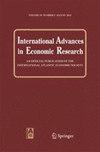捷克共和国和欧盟国家的房地产税收方法
IF 0.7
Q3 ECONOMICS
引用次数: 0
摘要
房地产税在欧盟并不统一。各州在设计此类税收时采用不同的方法,占总税收收入的比例也各不相同。捷克共和国的房地产税收入很低。这项税提供了增加收入的一个潜在来源。这项研究旨在确定不同的方法是否会影响房地产税的征收。本文的目的是评估各自州的房地产税方法。从税收受益人的角度和税收的设计要素对方法进行了评估。因此,对转型经济和市场经济进行了比较。本研究评估来自捷克共和国金融管理局和欧盟统计局的二手统计数据。还介绍了在捷克共和国进行的初步研究的结果。根据非参数检验,无论是房地产税占税收总收入的百分比,还是人均房地产税收入,都不取决于谁制定税收的设计要素,以及谁是受益者。确认了转型经济和市场经济在处理房地产税方面的差异。在房地产税领域,转型经济尚未适应市场经济的典型趋势。本文章由计算机程序翻译,如有差异,请以英文原文为准。
Approaches to Real Estate Taxation in the Czech Republic and the EU Countries
Real estate taxes are not harmonized in the European Union. Individual states use different approaches when designing such taxes and the percentage of total tax revenues varies. Real estate tax revenues are low in the Czech Republic. This tax offers a potential source of increased revenue. The research seeks to identify whether different approaches affect real estate tax collection. The objective of this article is to evaluate approaches to real estate taxation in the respective states. Approaches were evaluated from the perspective of the tax beneficiary and by the design elements of the tax. Consequently, a comparison of transition and market economies was performed. This research evaluates secondary statistical data from the Financial Administration of the Czech Republic and Eurostat. The results of primary research conducted in the Czech Republic are also presented. Based on non-parametric tests, neither real estate tax as a percentage of total tax revenue nor real estate tax revenue per capita depend on who sets the design elements of the tax and who is the beneficiary. Differences between transition and market economies in the approach to real estate taxes were confirmed. In the area of real estate taxation, transition economies have not yet adapted to the trend, typical for market economies.
求助全文
通过发布文献求助,成功后即可免费获取论文全文。
去求助
来源期刊

International Advances in Economic Research
ECONOMICS-
CiteScore
1.50
自引率
8.30%
发文量
19
期刊介绍:
International Advances in Economic Research (IAER) was established to promote the dissemination of economic and financial research within the international community. Founded in 1995 by the International Atlantic Economic Society, a need was identified to provide the latest research on today''s economic policies and tomorrow''s economic and financial conditions. Economists can no longer be concerned with professional developments only in their home country. Research by scholars in one country can easily have implications for other countries, yet often vital results are not shared. Economic restructuring in a shrinking world demands close analysis and careful interpretation. In IAER, authors from around the globe look at these issues, coming together in the cross-fertilization of multinational ideas. The journal provides economists, financial specialists, and scholars in related disciplines with much-needed opportunities to share their insights with worldwide colleagues. Policy-oriented, empirical, and theoretical research papers in all economic and financial areas are welcome, without regard to methodological preferences or school of thought. All manuscripts are submitted to a double-blind, peer review process.
In addition to formal publication of full-length articles, IAER provides an opportunity for less formal communication through its Research Notes section. A small point may not be worthy of a full-length, formal paper but is important enough to warrant dissemination to other researchers. Research in progress may be of interest to other scholars in the field. A research approach ending in negative results needs to be shared to save others similar pitfalls. Research Notes has been established to facilitate this form of communication. The section provides a means by which short manuscripts of less than 200 words can quickly appear in IAER. The review process for these shorter manu scripts is usually completed within 30 days.
Officially cited as: Int Adv Econ Res
 求助内容:
求助内容: 应助结果提醒方式:
应助结果提醒方式:


